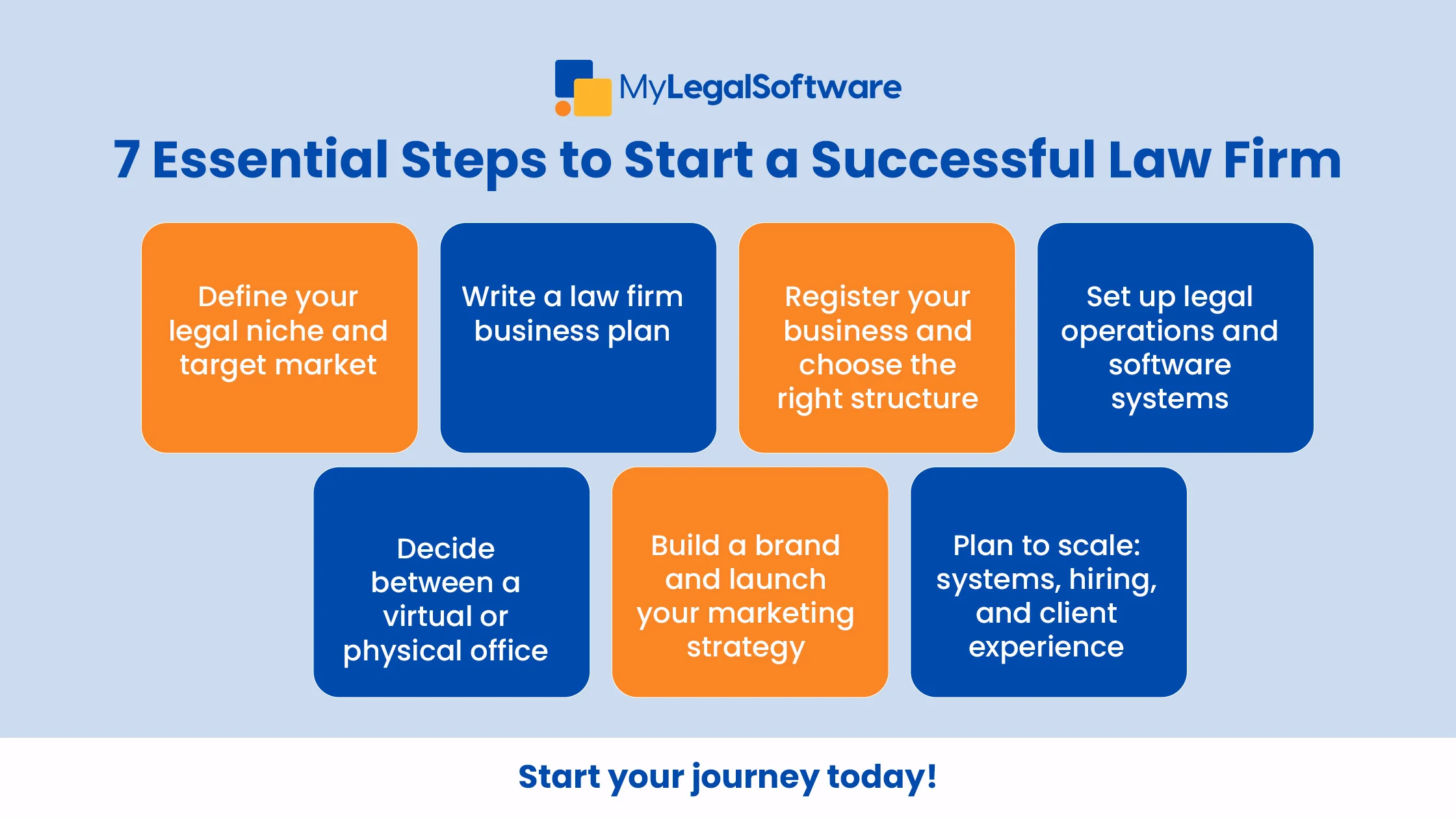Starting a law firm can be both a bold professional milestone and a daunting challenge. Whether you’re a seasoned attorney ready to leave a firm or a young lawyer dreaming of building your own practice, the idea of starting a law firm stirs up a mix of excitement, anxiety, and ambition. This guide is designed to walk you through every essential step—from business planning and registration to marketing and scaling, so you can build a firm that’s successful, compliant, and profitable.
If you’ve been wondering how to start a law firm, how hard it is, or even how long it takes to start a law firm, you’re in the right place.

Let’s get into it.
Is Starting a Law Firm Right for You?
Before diving into the logistics of starting up a law firm, it’s important to ask yourself: How hard is it to start a law firm? The answer depends on your mindset, resources, and readiness to shift from a legal practitioner to a business owner. Starting a law firm isn’t just about practicing law, it’s about building systems, managing finances, serving clients, and marketing your brand.
You must be prepared to wear multiple hats. A successful law firm founder typically exhibits strong organizational skills, adaptability, risk tolerance, and a vision for long-term growth. If these traits resonate with you, you’re already on the right path.
How to Start a Law Firm: 7 Key Steps to Build a Profitable Legal Practice

Step 1: Create a Business Plan That Works for Your Legal Niche
No successful law firm begins without a solid business plan. It doesn’t need to be a 50-page document, but it should clearly outline your vision, legal niche, market, financial goals, and operational strategy.
Start by choosing your area of focus. Are you planning to open a patent law firm, a criminal law firm, or a small boutique practice? Each requires different licensing, marketing, and operational considerations. Knowing how to start a criminal law firm, for instance, means understanding court appearances and client representation processes, while starting a patent law firm leans more heavily on intellectual property law and paperwork.
Your business plan should answer:
- Who is your target client?
- What are your legal service offerings?
- What will your pricing model look like?
- How will you handle billing and case management?
This step sets the foundation for your law firm’s structure, growth strategy, and day-to-day operations.
Step 2: Register and Structure Your Law Firm Legally
Once you’ve laid out your business plan, it’s time to turn your idea into a legally recognized business. Choosing the right business structure, whether it’s a sole proprietorship, LLC, PC, or LLP, will affect your liability, taxes, and legal obligations.
You’ll need to:
- Register your business entity with your state.
- Obtain your EIN (Employer Identification Number) from the IRS.
- Ensure compliance with state bar rules and requirements.
- Get malpractice insurance.
- Apply for necessary local business licenses.
Many lawyers ask how to start a new law firm without getting overwhelmed — and the key is to approach it step-by-step, prioritizing legal compliance and documentation first.
Step 3: Set Up the Right Tools and Legal Operations
Modern law firm operations are driven by technology. From case tracking to client communications, investing in the right legal tech will help your firm function efficiently, especially if you’re starting a small law firm or operating solo.
Here’s what you need:
- Case management software (like MyLegalSoftware)
- Document automation tools (LawYaw, DocuSign)
- Billing and time tracking systems
- Cloud-based storage for files and contracts
- Secure communication channels for clients
Even if you’re starting a law firm from scratch, adopting these systems early can save time, prevent burnout, and boost client satisfaction. It also makes scaling easier down the line.
Step 4: Choose Your Office Setup: Virtual or Physical?
A key question many attorneys face is whether to invest in a physical office or go virtual. If you’re starting up a law firm on a budget, a home office or shared workspace can help minimize overhead. However, if your clients expect face-to-face interactions, a small physical office may be worth the investment.
No matter your setup, make sure you have:
- A professional business phone number and email
- Secure internet access
- A quiet, private space for client communications
Both virtual and physical law firms can succeed—you just need to align your setup with your clients’ expectations and area of practice.
Step 5: Build Your Law Firm’s Brand and Online Presence
Your next challenge? Marketing. A firm without visibility is a firm without clients. Begin by naming your law firm professionally and securing your domain. Then build a clean, informative website optimized for search engines using your core keywords attached to the niche(s) you’re sticking to.
Your marketing strategy should include:
- Blogging about common legal questions
- Claiming and optimizing your Google Business Profile
- Creating informative social media content
- Asking clients for reviews
- Your Unique Value Proposition (UVP) as a law firm
If your goal is to start a successful law firm, remember that consistent, ethical, and value-driven marketing isn’t optional; it’s essential.
Clients don’t choose lawyers based on expertise alone; they choose based on trust, visibility, and relatability. To stand out in a competitive legal landscape, your marketing efforts must reflect integrity, professionalism, and a clear understanding of your clients’ needs. Whether it’s through educational blog content, community involvement, client-focused social media, or informative email newsletters, your marketing should consistently provide value. That means offering answers before they’re asked, showing up where your ideal clients are, and building genuine relationships over time.
Step 6: Hiring and Staffing Smartly
You may be tempted to do everything yourself when starting a small law firm — and that’s fine at the beginning. But as your caseload grows, burnout becomes real.
Start by outsourcing tasks:
- Virtual assistants
- Bookkeeping and accounting
- Marketing or content writing
- Legal interns
Eventually, you’ll want to hire paralegals, associates, and admin staff. Scaling is part of learning how to start up a law firm that thrives, not just survives.
Step 7: Grow Your Practice with Intention
Once your firm is operational, you’ll need to think about long-term growth. This means building systems, refining client intake, tracking KPIs, and collecting client reviews.
Here’s how to start and grow a law firm sustainably:
- Offer retainer packages or subscription models
- Ask for Google reviews and client referrals
- Automate onboarding and communication workflows
- Monitor revenue, expenses, and conversion rates
Whether you’re starting a law firm for the first time or transitioning from solo practice to multi-partner firm, scaling is where business acumen truly kicks in. This is also the time to start building a team culture if you plan to expand. Leadership, delegation, and clear firm values will make your practice scalable and sustainable.
Frequently Asked Questions
-
How long does it take to start a law firm?
-
Can I start a law firm fresh out of law school?
-
How much does it cost to start a law firm?
-
What makes a law firm successful?
-
What are the most important tools for starting a law firm?
It can take anywhere from a few weeks to several months, depending on your state, licensing requirements, and setup process.
Yes, though it’s more challenging. It’s critical to find mentors, partner with experienced attorneys, or at least practice under a licensed attorney if your state requires supervision.
Costs range from $3,000 to $20,000 depending on your location, office setup, software needs, and insurance. Starting virtually can significantly reduce expenses.
Clear systems, ethical practice, responsive service, client trust, and consistent marketing all contribute to long-term success.
Legal CRM, document automation, billing software, calendar management, and secure communication tools are key.
Final Thoughts
Starting your own law firm is a bold step, but it can also be a fulfilling one. With the right planning, tools, and mindset, you can build a law firm that aligns with your values and serves your clients with excellence.
Whether you’re figuring out how to start a criminal law firm, how to start a small law firm, or how to grow your new law firm, let this guide be your foundation.
If you are ready to start your law firm, don’t just think about launching—think about scaling smart from day one. One of the most powerful ways to do that is by integrating the right systems early on. Whether you’re about to start your law firm or managing a growing mid-size firm, your operations will only be as effective as the tools you use. That’s where MyLegalSoftware (MyLS) comes in.
From automated workflows and client communication portals to task tracking, flat-rate billing, and seamless implementation of Alternative Fee Arrangements (AFAs), MyLS equips law firms with everything they need to stay organized, client-focused, and profitable. It’s more than just software — it’s a business partner designed to support how you run and grow your practice.
Start your free 14-day trial today and discover how smarter billing and streamlined systems can transform your law firm’s future.








